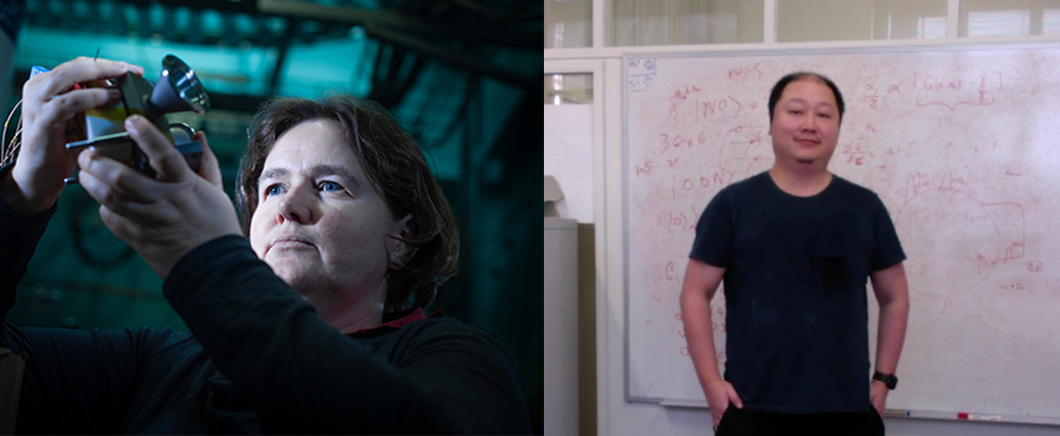Quantum technology and sustainably produced chemicals – how Swinburne scientists are paving the way to a brighter future

In summary
- Swinburne scientists will lead the way in sustainability and quantum technologies thanks to $1.75M in Australian Research Council (ARC) Future Fellowship grants
- Associate Professor Rosalie Hocking will help place Australia at the forefront of the sustainable production of commodity chemicals by developing new catalysts
- Dr Jia Wang will offer new insight into polaron physics and pave the way to engineer polaron-based materials for applications in emergent quantum technologies
Two Swinburne University of Technology Scientists will place Australia at the forefront of the sustainable production of commodity chemicals and the development of quantum technologies, thanks to $1.75M in Australian Research Council (ARC) Future Fellowship grants.
Associate Professor Rosalie Hocking is a chemist researching sustainable ways to produce commodity chemicals (like hydrogen and ammonia) from solar powered electricity.
Dr Jia Wang is a quantum physicist who has conducted pioneering research and made significant contributions to the development of quantum technologies.
Swinburne’s Deputy Vice-Chancellor, Research, Professor Karen Hapgood, said the grants were testament to the quality of the work being produced at Swinburne.
“Quantum technologies and sustainability are key global priorities, and it is fantastic to see Swinburne researchers leading the way in addressing key issues and contributing towards a better future,” Professor Hapgood said.
“Swinburne has significant expertise in both quantum experiments and theory, aligning with the National Quantum Strategy, and Dr Wang is a future leader in the field. We have also established a new Innovative Planet Research flagship and Associate Professor Hocking will be able to accelerate her green chemistry contributions for a more sustainable world.”
Swinburne has more than doubled its success rate for ARC grants since 2019, reflecting the high-quality submissions Swinburne researchers are putting forward.
“Our success in this round speaks to the quality of our research and our strong culture of collaboration and co-creation with academia, industry and the community,” Professor Hapgood said.
The Future Fellowships scheme honours recipients’ dedication, hard work, high-quality research and leadership ability.
Innovations in green chemical manufacturing
Associate Professor Hocking’s project will provide significant economic and environmental benefits by placing Australia at the forefront of the sustainable production of commodity chemicals.
This project will explore new synchrotron techniques with the Australian Synchrotron, where Associate Professor Hocking uses X-rays to find out how new materials work, and why sometimes they don’t.
Associate Professor Hocking believes the fellowship will be transformative for her career.
“It will give me time and resources to develop a range of new analytical techniques that will enable us to see what is happening in electrolysers and lead new design concepts for catalysts,” Dr Hocking said.
Associate Professor Hocking was awarded $974,474 for the project.
Harnessing the quantum properties of advanced materials
Dr Jia Wang will develop new approaches to investigate polarons and polaron interactions. A polaron is a phenomenon used to understand the interactions between electrons and atoms in a solid material.
Dr Wang is thrilled about the project, which will describe disturbances to particles when immersed in a quantum environment.
“This project will generate crucial knowledge for harnessing the quantum properties of advanced materials and developing quantum technologies,” Dr Wang said.
“I am eagerly looking forward to seeing my project begin, and I am immensely grateful to my supervisor, colleagues, and the excellent research environment provided by Swinburne.”
Dr Wang was awarded $777,829 for the project.
-
Media Enquiries
Related articles
-

- Technology
- Science
- Engineering
Victorian students drive green energy transition through international hydrogen competition
Swinburne’s KIOSC, in collaboration with Horizon Educational and Gippsland Tech School, co-hosted the Hydrogen Grand Prix in Melbourne.Friday 26 July 2024 -

- University
The future of fashion: Swinburne launches groundbreaking tech-focused fashion course
Swinburne University of Technology is fusing high tech and high fashion to launch a new forward-thinking Bachelor of Design (Fashion).
Thursday 25 July 2024 -

- University
Swinburne achieves first Cygnet Award through SAGE Athena Swan program
Swinburne has achieved its first Science in Australia Gender Equity (SAGE) Athena Swan Cygnet Award.
Monday 01 July 2024 -

- University
Future of National Institute of Circus Arts (NICA) secured
NICA will transition from Swinburne to the Australian College of the Arts (Collarts), as part of a new agreement that secures the future of circus arts in Australia.
Monday 22 July 2024 -

- University
Swinburne among world’s top 15 universities for scientific impact
Swinburne has been ranked in the top 15 universities in the world for scientific impact across all disciplines, based on the proportion of a university’s papers that belong to the top 1 per cent most cited in the 2024 CWTS Leiden Rankings.
Friday 19 July 2024

